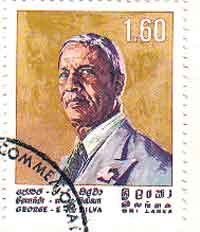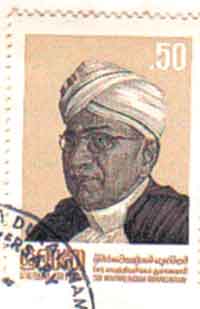A national leader is born
Another national leader was born on June 8, 1879. He is George Edmund de Silva, a lawyer from Kandy who played a prominent role in the struggle for independence. He joined A. E. Goonesinghe's Labour Party and was a pioneer in the formation of the Ceylon National Congress. He served as President of the Congress with S .W. R .D. Bandaranaike & J. R. Jayewardene as joint secretaries. In fact, he was President on four occasions. In 1921 & 1925 he contested and won the Central Province rural seat in the Legislative Council. He served the hill capital as an active member of the Kandy Municipal Council for over two decades. He played a prominent rule in putting into effect the abolition of feudalism in the Kandyan provinces. He also fought to secure universal adult suffrage. The Donoughmore Commission recommended that persons over 21 years of age be given the right to vote. It was implemented from the 1931 elections to the State Council. Sri Lanka became the first Asian country to enjoy the privilege of adult suffrage. Having served as a member of the Executive Committee of Health in the second State Council (1936), George E .de Silva became Minister of Health in 1942 and was responsible for radical reforms in the health sector. The training of nurses in Sinhala and Tamil was introduced by him and he implemented a scheme to set up rural hospitals, maternity homes, maternity clinics and child welfare centres in remote areas. He was in the forefront in the movement to shift the university to Peradeniya. He served as the Minister of Health in the first D. S. Senanayake Cabinet (1947) as Minister of Health. He passed away on March 12, 1950 and was honoured with the release of a stamp on June 8, 1980 to mark his 101st birth anniversary. Mr. Speaker plays a vital role The Speaker is the Presiding Officer of the legislature in many countries which have adopted the British system of government. He is not only a mere officer who presides at the sessions of the legislature, but also protects the powers and privileges of the representatives of the people. He wields his powers through Standing Orders as well as convention and practice built up over the years.
In Sri Lanka, before the Parliament was instituted by the Soulbury Constitution, the legislature was the State Council set up in 1931 following the recommendation of the Donoughmore Commission. The proceedings in the State Council were quite similar to Parliament with a Speaker being elected by the elected representatives of the people at the first meeting of the Council. A. F. (later Sir Francis) Molamure was elected Speaker of the first State Council. Following his resignation due to personal reasons, Deputy Speaker Forrester Obeysekera was elected Speaker.
Born on June 8, 1874, Sir Waitiyalingam had his early education at Jaffna College and Jaffna Central College. He graduated with double honours from the University of Calcutta and qualified as an advocate from Ceylon Law College. He rose rapidly to become Crown Advocate and leader of the Jaffna Bar. In 1921 in the first elections on a provincial basis he represented the Northern Province in the Legislative Council and was returned uncontested in 1924. An ardent advocate of communal harmony and understanding, he was in the forefront of the fight for independence. In 1936 he was returned uncontested and after being elected Speaker, he served for eleven years since the term of office of the second State Council was extended because of World War II. He died on April 12, 1966. A commemorative stamp was released on June 14, 1982. Sinhala Catholic weekly A weekly newspaper 140 years old today had its beginnings on June 7, 1866. The newspaper is 'Gnannartha Pradeepaya' the Sinhala Catholic weekly. It was printed at a press set up in Kotahena called the Catholic Orphan Press managed by the Catholic Society Ltd. The name of Juan Fernando of Kotahena has been recorded as the first editor of 'Gnanartha Pradeepaya.’ While the eight-page tabloid paper was printed once a week, the English version, 'The Catholic Messenger' was released twice weekly. That was also printed at the same press. Due to lack of funds, the printing press changed hands in the early 1870s and the newspaper was printed at another press in Pettah under the direction of Fr. David Gabriel Fernando, one of the few local Catholic priests at the time. He was a scholar in English, Sinhala and Tamil with a good knowledge of Pali and Sanskrit. Although there were disruptions in the printing of both the Sinhala and English Catholic newspapers from time to time, both newspapers continue to be published to this day at the Catholic Press in Borella in the premise of the Bishop's House. |
|||||||
Copyright © 2006 Wijeya Newspapers
Ltd. All rights reserved. |

